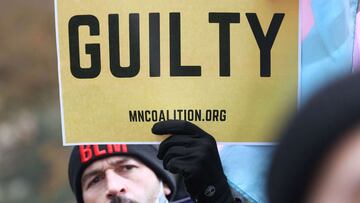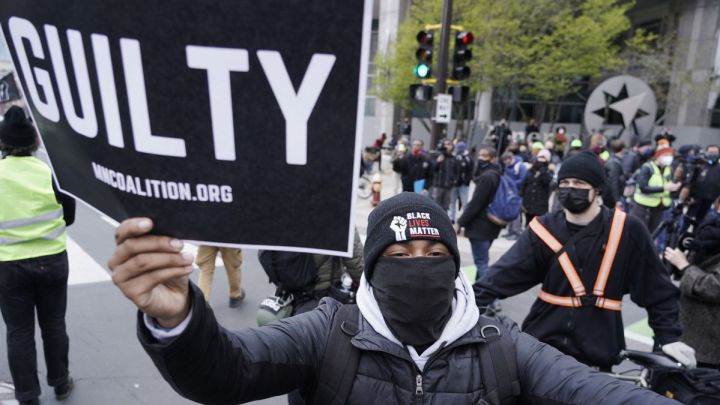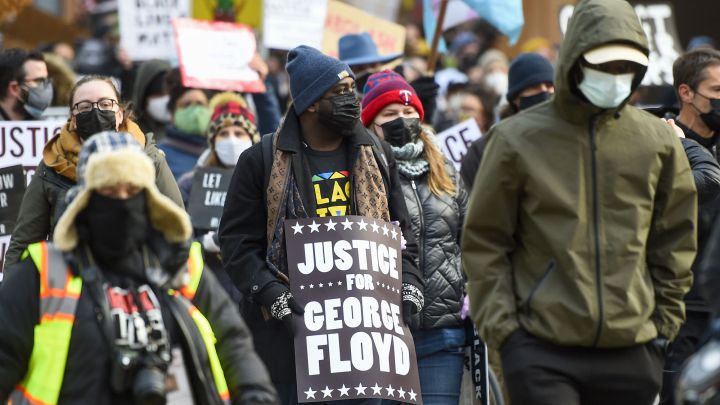Derek Chauvin found guilty of murder of George Floyd, updates, reaction
Chauvin was found guilty on all counts including second and third-degree murder in the death of George Floyd in Minneapolis on 25 May last year.

Show key events only
Derek Chauvin trial verdict: live updates
US Soccer releases statement regarding the conviction of Derek Chauvin
Statement from US Soccer on the conviction of Derek Chauvin.
"Today’s verdict is one of justice for George Floyd’s family. It does not, however, ease the heartbreak or represent closure. In fact, the ruling serves as a reminder that we all have a responsibility to challenge and end the systemic racism, discrimination and hatred that continues to surface in our neighborhoods, schools, workplaces and lives."
Biden and Harris address the nation on Derek Chauvin verdict
"It was a murder in full light of day and pulled the blinders off the systemic racism that's a stain on our nation's soul."
A statement from Obama on Chauvin guilty verdict
"For almost a year, George Floyd's death under the knee of a police officer has reverberated around the world - inspiring marches, sparking conversations in living rooms and new legislation. But a more basic question has always remained: would justice be done?" Barack Obama
Governor Gavin Newsom on Derek Chauvin guilty verdict
California Governor Gavin Newsom expressed what many are expressing that no one can bring back George Floyd.
This verdict we certainly agree with, guilty on all charges. But we want our message to be very clear that this is just the first step. We know clearly that justice has been delayed.
Can lessons be learned from Derek Chauvin guilty verdict
Jason Johnson isn't pleased and doesn't feel satisfaction with the guilty verdict in the trial of Derek Chauvin for the killing of George Floyd. Without meaningful reform Chauvin will be considered just "one bad apple".
Judge Jeanine thinks Derek Chauvin's guilty verdict will stick
Millions saw George Floyd's death last spring through the videos recorded by numerous bystanders. Those same video were used by the prosecution to convence the jury of the former officers responsibility and guilt, Judge Jeanine feels that that evidences would make appealing his guilty verdict a lost cause.
Chauvin to await sentencing in custody
Mr. Chauvin, who has been out on bail since last fall, is now in police custody where he will await sentencing.
The sentencing guidelines for each of the two counts of murder, for a defendant like Mr. Chauvin with no criminal history, is 12.5 years. But the maximum sentences for each charge differ: Second-degree murder could be as high as 40 years in prison, while the maximum for third-degree murder is 25 years. Second-degree manslaughter, which carries a maximum sentence of 10 years, but under the guidelines he would most likely be sentenced to four years.
The jury's verdict delivers accountability for Derek Chauvin, but not justice for George Floyd. Real justice for him and too many others can only happen when we build a nation that fundamentally respects the human dignity of every person.
Derek Chauvin found guilty in killing of George Floyd
The jury found former Minneapolis police officer Derek Chauvin guilty on all three counts against him. When the verdict was heard at George Floyd Square the crowd assembled cheered the decision.
Watch live: Verdict in Dereck Chauvin trial expected soon
The 12 juror deliberated for around 10 hours over two days before reaching their verdict. The trial into the killing of George Floyd has lasted 16 days in total.
Derek Chauvin is found on all three counts
second-degree murder: guilty
third-degree murder: guilty
second-degree manslaughter:guilty
People gather at George Floyd Square
As the verdict will be announced momentarily people have gathered at the memorial site where George Floyd was killed 25 May, 2020.
Worries about the verdict in the killing of George Floyd
Much of downtown Minneapolis is boarded up with fears that the verdict in the trail of Derek Chauvin, the ex-cop who is on trial for the murder of George Floyd while in custody. The national guard has deployed to the areas around the courthouse where the verdict will be read shortly.
Now it appears that a general exodus is being made by residents and workers from the downtown ahead of the reading of the verdict.
No hung jury in Derek Chauvin verdict
A hung jury would have meant a mistrial. The defendant is not convicted, but neither is the defendant acquitted.
If there is mistrial the case may be retried.
If the jury chooses to find Chauvin and acquit him, the decision cannot be appealed by the prosecution, overturned by the judge, or retried.
If he is found guilty he can appeal the decision.
Jury in Derek Chauvin trail has reached a verdict
Mulitple media outlets report that a verdict is expected within an hour.
Waiting for a verdict in the Derek Chauvin trial
Jurors for a second day remain in deliberations, having begun at 8 am. Over 14 days of testimony they heard from 44 witnesses.
George Floyd’s cousin shares her thoughts on Chauvin verdict deliberations
Watch: Shareeduh Tate, George Floyd’s cousin and President of the George Floyd Foundation discuss her thoughts on the Derek Chauvin trial and how she thinks the jury will deliberate with MSNBC’s Craig Melvin.
What will happen to George Floyd Square after the verdict on Derek Chauvin?
George Floyd Square is an occupation protest and memorial site at the intersection of 38th Street and Chicago Avenue in Minneapolis, Minnesota. It is the site of where George Floyd lost his life when he was detained by former Minneapolis police officer Derek Chauvin who knelt on Floyd’s neck for 9 minutes and 29 seconds.
In the days following Floyd’s tragic death barricades were erected to block vehicular traffic and transformed the space with public art of Floyd and that of other racial justice themes. There is an ongoing debate as to what will happen to the space as some are pushing to reopen it while others want it to remain.
Will Geroge Floyd’s past hold sway for the jury’s verdict on Derek Chauvin?
Carl L Hart, is a neuropsychopharmacologist at Columbia University who researches drug addiction, breaks down how defense attorneys create a smoke screen, to generate empathy for the cop, and why too many judges and juries have fallen victim to this tired ploy.
He states “My work has focused on the unjust and unscientific stigmas surrounding drug use and the criminalization of drugs around the globe. The defense’s attempt to paint Mr. Floyd as a crazed drug addict relies on retrograde myths about the impact of drugs on our bodies and minds.”
“While it’s true Mr. Floyd had small amounts of methamphetamine and THC, the primary psychoactive ingredient in marijuana, in his blood — 19 and 2.9 nanograms per milliliter, respectively — those numbers strongly suggest he hadn’t used them in at least several hours, maybe a day.”

Who are the people deciding the verdict in the killing of George Floyd
The fate of Derek Chauvin is now in the hands of 12 of his peers. They will be tasked with reaching unanimous verdicts on three counts; second-degree murder, third-degree murder and second-degree manslaughter in George Floyd's death.
The Star Tribune has published information on those who were selected for the jury: their ages, marital status and occupations, as well as how they feel about Black Lives Matter, police in general and the presumption of innocence.
Photo by Ocatavio Jones of demonstrators demanding justice in Minneapolis Monday.
Can Biden heal nation after jury decide Derek Chauvin's fate?
NPR - As the jury deliberates in the trial of former police officer Derek Chauvin, who has been charged in Floyd's death, the looming verdict could be the first significant flashpoint over race and policing in Biden's presidency.
The conclusion of the trial could also compound a moment of intense pain over police killings in the United States. Biden is expected to speak after the verdict, and the president may try to heal the soul of a divided nation. But he also appears caught in a double bind.
Read the full story by Juana Summers
Get to know George Floyd’s brother while waiting for verdict on Derek Chauvin
Philonise Floyd, along with the rest of George Floyd’s family has been thrown into the public spotlight. He is still coming to terms with situation he finds himself, Robert Samuels at The Washington Post shares his journey:
Civil rights activism was not so much a calling, but a duty that helped make sense of a sudden, gruesome tragedy that had befallen his tightknit family. His journey has required him to reconcile the image of the brother he admired and the struggles of George Floyd that he had not fully comprehended.
Biden praying for "the right verdict" in killing of George Floyd
On Tuesday, President Joe Biden who has repeatedly denounced George death has avoided weighing in on the trial itself. Biden told reporters he was only weighing in on the trial because the jury in the case had been sequestered. The President felt the case to be "overwhelming."
Final instructions to jury in Derek Chauvin trial in the death of George Floyd
Former Minneapolis police officer Derek Chauvin is charged with three counts; second-degree murder, third-degree murder and second-degree manslaughter.
Judge Peter Cahill instructed the jury to not to let their own biases influence their decision. Nor should they consider any consequences or penalties when deliberating. He urged the jurors to "listen to one another."
How forensic examination of George Floyd opened a debate on bias
NYT - From the beginning, the death of George Floyd disrupted the field of forensic pathology in much of the way it challenged policing.
Days after Mr. Floyd’s death on May 25, prosecutors said it was caused not just by the police officer kneeling on his neck for nine minutes and 29 seconds, but also by his underlying health conditions and drug use.
Critics protested that the finding reflected racial bias — and served as a prime example of how forensic pathology has failed to do enough to counter its own subjectivity in decisions such as whether to classify a death in police custody as a homicide.
The public criticism helped expose long-simmering tensions within the small but influential world of medical examiners, drawing in some of the experts who consulted on the case or may be called to testify for the defense.
Read the full story by Shaila Dewan at The New York Times

Cities across US brace for verdict in Derek Chauvin trial
The jury has entered its second day of deliberations in Derek Chavin’s trial to consider his role in the death of George Floyd. Windows and store fronts in Minneapolis have been boarded up out of fears that violence could erupt depending on the verdict. Other cities across the US have made preparations too for the coming verdict.
From CNN here’s how other cities are preparing:
- In Los Angeles, police have stepped up community outreach efforts and planned to make additional officers available.
- In San Francisco, police said discretionary days off for officers have been canceled and additional officers will be deployed.
- The Atlanta Police Department said in a statement that it's coordinating efforts with local, state, and federal law enforcement and have officers prepared to respond quickly.
- In New York City, police were preparing for protests. NYPD Commissioner Dermot Shea said the city has averaged 10 to 20 protests a day basically since last year. "It's never really ended," he told 1010 WINS radio.
- The Philadelphia Police Department said it is prepared "with additional personnel to secure and patrol strategic locations."
- In Washington, DC, the Metropolitan Police Department will be "fully activated with members on 12-hour shifts starting Monday," according to spokesman Hugh Carew.
Craig Lassig captured this photo of a Minneapolis police officer behind a fence with razor wire watches as protesters march through the streets after attorneys finished closing arguments
As we await the verdict, there are several inescapable truths. Over this last year, our twin cities have experienced a barrage of trauma, all culminating with this trial and then the verdict. There’s been pain and anguish, anguish and frustration that is undoubtedly acutely felt by our black and brown communities. Regardless of the outcome of this trial, regardless of the decision made by the jury, there is one true reality, which is that George Floyd was killed at the hand of police.
George Floyd death: jury deliberations begin in Chauvin murder trial
George Floyd death: jury deliberations begin in Chauvin murder trial
Jury deliberations begin in the trial of Derek Chauvin, the officer charged with the murder of George Floyd that prompted millions to protest police brutality

Demonstrators march through downtown after the closing statements in the trial of former police officer Derek Chauvin, who is facing murder charges in the death of George Floyd, in Minneapolis, Minnesota, U.S (19 April)
The composition of the jury
The jury is comprised of four white women, two white men, three Black men, one Black woman and two multiracial women, according to court records. The court has promised to shield their identities until some time after they give their verdict.
The jury can set its own deliberation schedule in consultation with Hennepin County District Judge Peter Cahill, the court said. It deliberated for four hours on Monday after receiving the case at 4 p.m., and resumed at 8 a.m. on Tuesday.
No verdict on Monday
The jury began its deliberations on Monday after listening to closing arguments for most of the day. Jurors must reach a unanimous verdict on each charge to convict or acquit. A single hold-out would result in a mistrial, although the state could then try Chauvin again.
Chauvin pushed his knee into the neck of Floyd, a 46-year-old handcuffed Black man, for more than nine minutes outside the grocery store where Floyd had been accused of buying cigarettes with a fake $20 bill.
The case hinges on whether the jury believes the prosecution argument that Chauvin used excessive, and therefore illegal, force that killed Floyd. The defense has countered that Chauvin behaved as any "reasonable police officer" would," and sought to raise doubts about the cause of Floyd's death, saying heart disease or even the exhaust fumes from the nearby police car may have been factors.
Jurors met for a second day of deliberations on Tuesday in the trial of Derek Chauvin, the former Minneapolis police officer charged with murder and manslaughter after kneeling on the neck of a dying George Floyd during an arrest last May.
The 12 sequestered jurors are considering three weeks of testimony from 45 witnesses, including bystanders, police officials and medical experts, along with hours of video evidence that make up the most high-profile U.S. case involving accusations of police misconduct in decades.
Chauvin, who is white, has pleaded not guilty to second-degree unintentional murder, third-degree "depraved mind" murder and second-degree manslaughter.
On 25 May, 2020, George Floyd, a 46-year-old black man, was killed in Minneapolis, Minnesota, United States, while being arrested on suspicion of using a counterfeit bill. During the arrest Derek Chauvin, a white police officer with the Minneapolis Police Department, knelt on Floyd's neck for nine minutes and 29 seconds after he was handcuffed and lying face down.
Floyd had complained about being unable to breathe prior to being on the ground, but after being restrained he became more distressed, and continued to complain about breathing difficulties, the knee on his neck, and expressed the fear he was about to die. After several minutes passed Floyd stopped speaking.
Hello and welcome to our live coverage as we await the verdict from the jury relating to the fate of Derek Chauvin in death of George Floyd.

